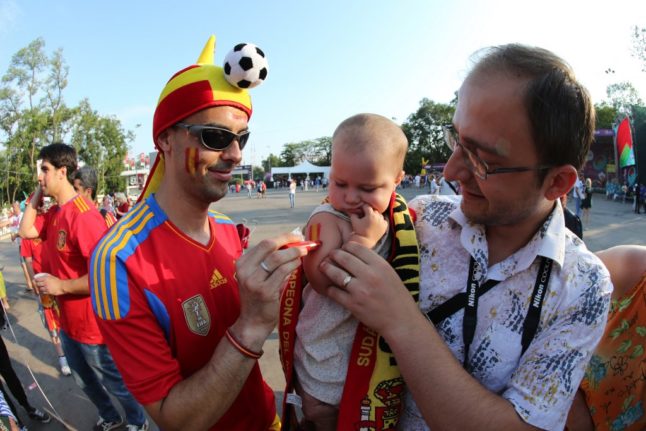One of the first questions foreign parents ask themselves when they’re about to have a baby in Spain is what nationality the child will have.
Foreign parents from most countries who have legal Spanish residency and have a baby in Spain will not be able to get Spanish citizenship for their new-born right away.
By law, they will first inherit the citizenship of their parents unless they are from Argentina, Cape Verde, Costa Rica, Cuba, Guinea Bissau, Panama, Paraguay, Peru, Portugal, San Tome and Principe, Uruguay or are stateless, in which case their child can get Spanish citizenship straight after birth. You can read about it in more detail here.
Parents from all other countries may only apply for Spanish citizenship for their child after he or she has continuously lived in Spain for a period of one year, usually from the date that their birth in Spain was registered.
This is covered in Spain’s Organic Law 4/2000, of January 11th, on the Rights and Freedoms of Foreigners in Spain and their Social Integration (articles 16 to 19 and 31) and the Regulation of Organic Law 4/2000, approved by Royal Decree 557/2011, of April 20th (article 186).
Keep in mind that this right to Spanish nationality after one year of residency continues throughout their life if they were born in Spain, so if you would rather wait for your son or daughter to decide later on in life if they want to be Spanish, they hold on to that right.
If your intention is for your child born in Spain to acquire Spanish citizenship as soon as possible, here’s what you have to do.
The first step is to register your baby’s birth at the Civil Registry, which can be done at the hospital or a few days later at the Registry Office.
READ ALSO: How to register your new baby in Spain and apply for a passport
Next, you will register your baby’s birth with the embassy or government of your home country and apply for a passport for them.
Most countries will grant this automatically for babies born abroad, although you will need to find out the specific process for your country.
READ ALSO: Does having a baby in Spain mean I can become Spanish?
Apply for residency first
Once you have all the paperwork pertaining to your baby’s nationality, you will need to apply for a residency card for them, in a similar process to the one that you applied for when you moved to Spain.
This is referred to as the Autorización de Residencia para menor nacido en España (Residency Authorisation for a minor who was born in Spain).
You will need to book a prior appointment at the police station to apply for a foreign identity card such as a TIE.
According to the Spanish government website, the prerequisites for this are that:
- The baby must not be an EU citizen or family member of an EU citizen
- They must have been born in Spain
- At least one of the parents must also have residency
For this, you will need:
- their birth certificate
- documents showing that the birth is registered in your home country such as a passport
- your residency documents
- padrón certificate from your town hall
- possibly extras such as your marriage certificate and your passports
- Anything not in Spanish or a co-official language in Spain such as Catalan must be fully translated by a sworn translator.
You will also need to fill out the form EX–01 for temporary residence or EX-11 for long-term residency.
If you are a European citizen, you can apply for a special permit for children born in Spain to Spanish residents, which can also be applied for at the police station by taking your child’s birth certificate, their nationality documents, and your green residency card.
The processing time should take around one month, after which you must take your child along with you when you go to collect their residency card.
How to apply for Spanish citizenship for your baby born in Spain after one year
After one year of legal residence in Spain, you can start the application of applying for Spanish citizenship by getting a Judicial Order from the Judge of the Civil Registry so that you can make this decision for a minor.
In order to complete the process you will need:
- Your child’s birth certificate
- Their residency card
- Their passport from your home country
- Residency certificates of the parents
- Passports and birth certificates of the parents
- Padrón certificate from your town hall
- Pay a fee of €102
Extras that may be requested are your marriage certificate if you have one.
Your child will not have to take the language or citizenship exam that adult applicants are required to as they are under 18 years old.
Keep in mind, foreigners who are in Spain on a student visa will not be able to apply for Spanish citizenship for their baby born here.
One of the parents must first modify their residence permit before they can move forward.
Be aware that not all countries recognise dual citizenship, including Spain (except with only a handful of countries), so your child may be forced to give up the nationality they acquired from you when they were born.
This is not always the case, but you may want to contact a lawyer about the legal ramifications of this if you decide to move forward with Spanish citizenship for your child.
READ ALSO: Do you really have to give up your nationality to become Spanish?



 Please whitelist us to continue reading.
Please whitelist us to continue reading.
Member comments